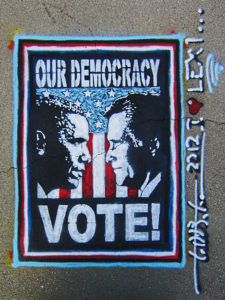The Problem with Voting

“The animals listened first to Napoleon, then to Snowball, and could not make up their minds which was right; indeed, they always found themselves in agreement with the one who was speaking at the moment.” Animal Farm, George Orwell
In a friendly conversation with a stranger at a bar, it occurred to me that there is something flawed with democracy. The man, quite talkative with a thick Eastern European accent was commentating on some of the recent news from around the world. He displayed an unusual sense of confidence when he spoke about the Middle East. Yet he couldn’t properly identify which capital cities belonged to which countries. He didn’t know any of the historical contexts of the subjects he was speaking about. That, fundamentally, is the problem with voting.
People only have superficial knowledge about the topics they habitually discuss. Elections are based on the idea that every person, above a certain age is allowed an equal vote. That skill, effort, or intelligence do not factor in. The imperfection of democracy is not a novel idea.
“The best argument against democracy is a 5 minute conversation with the average voter” – Churchill
Test the Voter?
Society is built upon the general principle that most high paying jobs can only be earned by passing through standardized tests, university programs, and interviews. But if people need to be qualified in order to work, then why don’t they need to be qualified to vote?
If I hired a plumber to fix my sink, I would want to know about his qualifications. I would also do the same for my mechanic, doctor, teacher, taxi driver, professor. A possible solution to this would be to test the competency of the voters in terms of political, historical, and social knowledge. Only those who have displayed adequate, relevant knowledge would be allowed to vote.
The situation as it is now undermines the seriousness of voting altogether. If the vote of a 60 year old who has deep knowledge of history has the same weight as the 25 year old who has spent the last 10 years of his life binge drinking, then why would anyone care about voting?
It’s not that knowledge is the only problem, it’s that the feelings of people in the age of technology are susceptible to manipulation in ways that were never possible in the past. The average voter, if not already highly educated, cannot protect himself against the barrage of attempts to hack his mind. And as Tristan Harris said in a Wired interview, these methods of persuasion are universal.
“I actually spent the last 10 years studying persuasion, starting when I was a magician as a kid, where you learn that there are things that work on all human minds. It doesn’t matter whether they have a PhD, whether they’re a nuclear physicist, what age they are. It’s not like, Oh, if you speak Japanese I can’t do this trick on you, it’s not going to work. It works on everybody. So somehow there’s this discipline which is about universal exploits on all human minds.” – Tristan Harris
The ideals of western democracy that may have worked in the 18th century no longer work today for this reason. They were constructed in a time where hacking on such a large scale was not possible.
“Our society is built on the ideas that the voter knows best, that the customer is always right, that ultimate authority is, as Tristan said, is with the feelings of human beings and this assumes that human feelings and human choices are these sacred arena which cannot be hacked, which cannot be manipulated. Ultimately, my choices, my desires reflect my free will and nobody can access that or touch that. And this was never true. But we didn’t pay a very high cost for believing in this myth in the 19th and 20th century because nobody had a technology to actually do it. Now, people—some people—corporations, governments are gaming the technology to hack human beings. Maybe the most important fact about living in the 21st century is that we are now hackable animals.” – Yuval Harari)